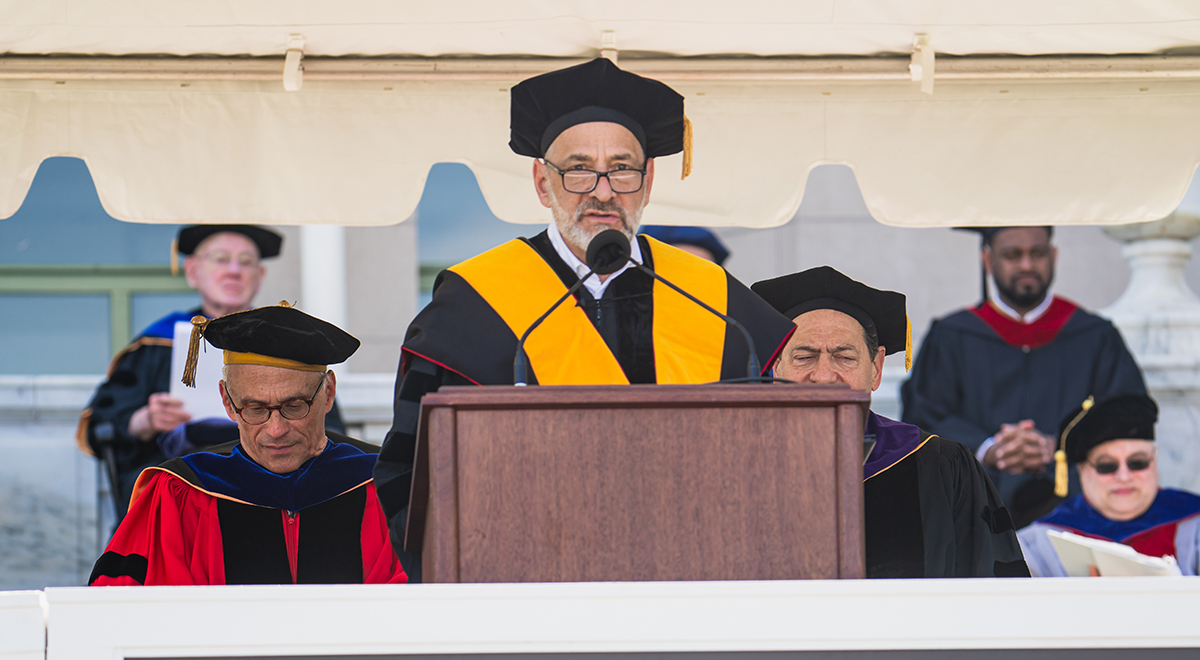Michael Greenberg ’76, P’14: There Are Countless Paths Toward Fulfillment

Michael Greenberg ’76, P’14, who was named an Honorary Doctor of Science at Wesleyan’s 192nd Commencement ceremony, recalled how his journey toward unraveling the scientific mysteries of human memory illustrates the possibilities available to the graduating Class of 2024.
“What can a Wesleyan graduate of almost 50 years ago who studies memory offer to you as you set forth in the world? There are countless paths that you might take in your lives that will offer you fulfillment,” Greenberg said. “In my own life the following has proved to be important: choosing a career that was challenging intellectually, where new discoveries—not necessarily scientific discoveries—were made on a frequent basis, and where I was able to make what I hope is an important positive contribution to the world through both mentorship and scientific discovery.”
One of the world’s most distinguished neuroscientists, Greenberg received a BA in Chemistry from Wesleyan University in 1976 and, since 2008, has been the Nathan Marsh Pusey Professor of Neurobiology at Harvard Medical School. Greenberg’s discoveries of activity-dependent gene transcription have revealed how nature and nurture cooperate to shape mammalian brain development and plasticity.
Greenberg made the following remarks during Wesleyan’s 192nd Commencement Ceremony on May 26:
Thank you President Roth, trustees, and good morning to all the graduates. I am excited to offer my heartiest congratulations to the Wesleyan Class of 2024. You have had the good fortune to attend an exceptional university, albeit at a difficult time with the world still reeling from the effects of the COVID pandemic, wars raging, and the society undergoing seismic changes. Despite the turmoil in the world that we are still facing, I fervently hope that you have been able to experience fully the wonderful things Wesleyan has to offer: a broad liberal arts education, classmates who have challenged you to think in new ways, professors who have inspired you, and fantastic experiences and friendships made outside of the classroom that have been life changing and may ultimately last you a lifetime.
I graduated from Wesleyan almost 50 years ago and I became a neuroscientist. I study the mechanisms in our brains that allow us to adapt and change in response to our environment. I’ve endeavored to understand how nature (the genes) and nurture (the environment) are intertwined to shape a functioning human being in a complex society. Since leaving Wesleyan I’ve been on a 50-year odyssey working with undergraduates, doctoral students, and postdoctoral fellows to tackle this fascinating challenge. This endeavor has required dedication, persistence, and some good luck.
One exciting, still-not-completely-answered question that we are tackling in the lab is how the brain stores long-term memories. How is it that I can remember the day of my graduation from Wesleyan so long ago—that I wore a suit jacket under my gown and, like many of you today, was very hot and uncomfortable. I remember a sea of students, my classmates in red graduation gowns, and feelings of excitement to be moving on to the next phase of my life, but also feelings of sadness to be leaving Wesleyan and close friends behind.
These memories are very important because they connect the past to the present and allow us to learn and evolve. Memories are also crucial for connecting us to one another. Obtaining a deep understanding of memory is, of course, a thrilling intellectual challenge, but also offers hope for new ways of treating a wide variety of neurological and psychiatric disorders that afflict many in our society.
So what can a Wesleyan graduate of almost 50 years ago who studies memory offer to you as you set forth in the world? There are countless paths that you might take in your lives that will offer you fulfillment. In my own life the following has proved to be important: choosing a career that was challenging intellectually, where new discoveries—not necessarily scientific discoveries—were made on a frequent basis, and where I was able to make what I hope is an important positive contribution to the world through both mentorship and scientific discovery. Of course, one shouldn’t forget the vital importance of friends and family, the forging of new friendships but also maintaining those that you have made during your years at Wesleyan. And I just point out, that this will take some effort.
When President Roth contacted me with the news that I was to receive an honorary degree at your graduation, I responded, “It is hard for me to imagine an honor that would mean more to me.” Wesleyan has had a significant place in my heart and mind even after 50 years. For today’s graduates, my hope is that your lives will be everything that you hope for, and that 50 years from now you will feel, as I do today, immensely grateful for my Wesleyan experience and for the recognition that comes with this prestigious honorary degree.

